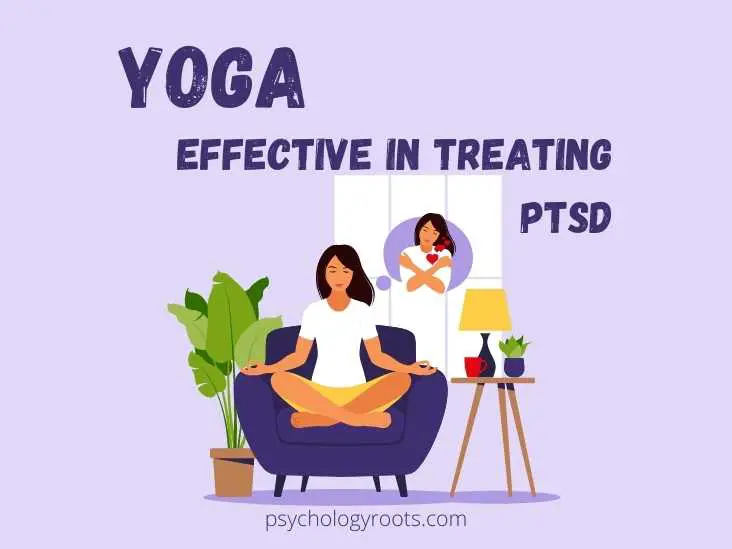Table of Contents
Is yoga effective in treating PTSD?
Here in this post, we are discussing and learning about “Is yoga effective in treating PTSD?”. You can read more about psychology-related material on our website. Keep visiting Psychology Roots.
Is yoga effective in treating PTSD?
A longtime focus of Dr. Rachel Bollaert’s is the connection between physical exercise and the brain. Because of this, she jumped at the chance to collaborate with Dr. Jacklynn Fitzgerald, an assistant professor of psychology who specializes in helping soldiers suffering from PTSD. Together, they went about helping a particularly vulnerable segment of society: U.S. war veterans.

Is yoga effective in treating PTSD?
There are only a few ways to treat this condition that affects 12 million adults in the United States each year, so Bollaert and Fitzgerald applied for funding from the Clinical Translational Science Institute of Southeast Wisconsin (CTSI) to study how physical activity, specifical yoga, can help alleviate these patients’ symptoms.
CTSI awarded the study team, which includes co-principal investigators Drs. Cecelia Hillard, assistant dean for research at the Medical College of Wisconsin, and Dr. Jeff Whittle, a staff physician at the Clement J. Zablocki VA Medical Center, an additional $27,015.
Those who use standard therapy to help people with PTSD frequently turn to supplementary methods to help them cope with their symptoms, as Fitzgerald points out. Fitzgerald points out that, like many Americans, veterans report low rates of physical activity, despite some studies demonstrating the advantages of exercise and physical activity.
A dearth of knowledge on the therapeutic advantages of physical activity and possible impediments to exercise were addressed in the study’s first phase.
The researchers conducted an online survey of veterans in southeastern Wisconsin to learn more about their current physical activity levels, motives for exercise, and obstacles to exercise, as well as their ideas and experiences with yoga.
Veterans took part in a yoga program at the Athletic and Human Performance Research Center in phase two of the experiment.
Biometric tests of body composition, muscular strength, range of motion, and aerobic fitness as well as psychological measures such as cognition and self-efficacy, and motivation were performed by twelve veterans in phase two.
Fitzgerald says that knowing how the body responds to stress is critical to understanding how yoga may modify that reaction.
Using laboratory rats, Hillard studies the impact of trauma on her subjects. Stress triggers the release of hormones, but few people are aware that the endocannabinoid system, a separate but related system, is also involved in regulating physiological and mental functions, including stress. Rodents that have been traumatized exhibit signs of dysfunction in this system, according to Hillard.
For Fitzgerald, “Our current work is at the vanguard of transferring what we know about this system in a preclinical model, like as in rats, to what we know about people, and then, especially those who suffer from diseases like PTSD,” she says.
‘The disorder’s face,’
The cohort also includes Vietnam veterans who have suffered from PTSD for decades, according to Bollaert, who says that although some of their participants are younger veterans in their late 20s or early 30s. There is a strong feeling that they have tried many various approaches over the years, and it is vital to realize that they haven’t had access to beneficial therapies, says she.
Yoga sessions have been well-attended, and the participants’ reaction has been overwhelmingly favorable, according to the study’s findings. Fitzgibbons partly attributes this to a teacher who received special training from the Veterans Yoga Project, an organization that promotes yoga as a healing technique that incorporates elements of mindfulness and mindful resilience.
Fitzgerald, Bollaert, and the rest of the team plan to work on data processing throughout the summer so that they may have a first look at the study’s primary results by the conclusion of the season. The yoga sessions will continue until May.
According to Bollaert and Fitzgerald, research like theirs is in high demand.
There is little doubt that veterans suffering from post-traumatic stress disorder (PTSD) are the face of the condition. When it comes to treating PTSD, “a lot of people understand the fact that soldiers may have PTSD, but that community is totally poorly serviced,” Fitzgerald adds. “The ordinary veteran does not have access to medical treatment. They don’t get many referrals. Treatments are finished in the end. As a result, they are undoubtedly the most deserving of some type of therapy and the most likely to profit from it.”
Summary
Dr. Rachel Bollaert and Dr. Jacklynn Fitzgerald are studying whether yoga can help soldiers suffering from post-traumatic stress disorder (PTSD). PTSD is a mental and physical condition that affects 12 million adults in the U.S. each year. Many veterans report low rates of physical activity, despite some studies demonstrating its benefits. Yoga sessions have been well-attended, and the participants’ reaction has been overwhelmingly favorable, according to the study’s findings. Fitzgibbons partly attributes this to a teacher who received special training from the Veterans Yoga Project. The yoga sessions will continue until May.
Help Us Improve This Article
Have you discovered an inaccuracy? We put out great effort to give accurate and scientifically trustworthy information to our readers. Please notify us if you discover any typographical or grammatical errors.
Make a comment. We acknowledge and appreciate your efforts.
If you have any scale or any material related to psychology kindly share it with us at psychologyroots@gmail.com. We help others on behalf of you.